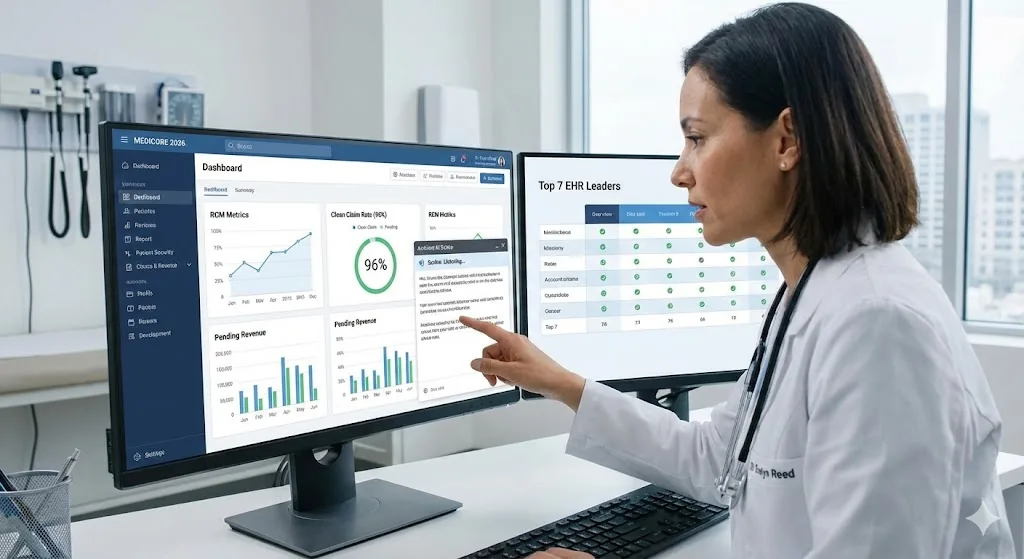The Financial Engine of Your Practice: A 2026 Guide to Top EHR Systems
For medical professionals in 2026, an Electronic Health Record (EHR) is no longer just a digital version of a paper chart; it is the financial and clinical operating system of the practice. In a landscape of rising overhead and complex reimbursement models, choosing the right EHR is the difference between a streamlined Revenue Cycle Management (RCM) and a practice drowning in “uncollectible” denials.
The Hidden ROI of a High-Performance EHR
While most administrators view EHRs purely as a cost center, a top-tier system provides a massive return on investment (ROI) by attacking three primary revenue leaks:
-
Coding Accuracy: Automated E/M coding suggestions reduce “under-coding” (lost revenue) and “over-coding” (audit risk).
-
Clean Claim Rate: Systems with built-in “scrubbers” can push clean claim rates above 95%, drastically reducing the 30-day AR bucket.
-
Documentation Integrity: In a billing dispute, the EHR is your legal shield. High-resolution, time-stamped clinical notes make it nearly impossible for a debtor to claim “services not rendered” during the recovery process.
Top 7 Market Leaders
Choosing a system depends on your scale. A solo practitioner has vastly different needs than a multi-specialty health system.
| System | Avg. Monthly Cost | Best For | Key 2026 Features | RCM/Billing Strength |
| Athenahealth | 7% – 9% of Collections | Small to Large Practices | AI-driven “billing rules engine,” cloud-native, excellent patient portal. | High: Fully integrated RCM services. |
| Epic (Community) | $500 – $1,200 /provider | Mid-size to Enterprise | “MyChart” ecosystem, TEFCA interoperability, massive data sets. | High: Gold standard for hospital billing. |
| eClinicalWorks | $449 – $599 /provider | Mid-market & Multi-site | V12 interface, AI Scribe integration, built-in telehealth. | Moderate: Strong internal tools. |
| NextGen | $400 – $600 /provider | Specialty Practices | Deep templates for Ortho, Ophtho, and Cardio; specialized reporting. | High: Very customizable billing workflows. |
| ModMed (EMA) | $400 – $550 /provider | Specialty-Specific (Derm/Ortho) | Adaptive learning “EMA” interface, touch-first design, specialty coding. | High: Native RCM designed for specific ICD-10 sets. |
| AdvancedMD | $300 – $500 /provider | Independent Clinics | Automated patient journey, robust dashboard reporting, high-speed scheduling. | High: Powerhouse for in-house billing teams. |
| Elation Health | $300 – $450 /provider | Independent Primary Care | Cleanest UI, clinical-first design, rapid charting speeds. | Low: Best used with a 3rd party billing partner. |
Typical Costs: The “Total Cost of Ownership” (TCO)
When calculating the cost of an EHR, looking at the monthly subscription fee is a mistake. Medical professionals must account for:
-
Implementation Fees: Range from $2,000 to $25,000 for small practices, while mid-size organizations often invest $300,000–$400,000 in total setup costs over 6–9 months.
-
The Productivity Dip: Plan for a 20-30% reduction in patient volume during the first 30 days of “Go-Live.”
-
Annual Maintenance: Expect to pay 15–20% of the initial investment annually for patches, security, and technical support.
Essential Features to Look For
-
Ambient AI Scribing: The software should “listen” to the patient encounter and draft the note in real-time, saving physicians up to 2 hours of charting per day.
-
TEFCA Interoperability: Ensure the system is part of the Trusted Exchange Framework and Common Agreement, allowing seamless data sharing between different hospital systems.
-
Propensity-to-Pay Scoring: AI that flags patients who may need a payment plan before the balance becomes delinquent.
-
Integrated Patient Payments: The portal must support Apple Pay, Google Pay, and text-to-pay. Frictionless options reduce the need for external collections by 30%.
The Specialty-Specific Advantage
Choosing a “Specialist” system like ModMed over a “Generalist” like Athenahealth often comes down to the Template Tax. General systems require hundreds of hours of customization to work for a specialist (e.g., a Cardiologist). If your system isn’t tailored to your specialty, providers spend an extra 1.5 minutes per patient clicking through irrelevant fields. Over a year, this inefficiency can cost a practice $20,000 in lost productivity per physician.
How Your EHR Affects Debt Recovery
At NexaCollect, we see a clear correlation: Practices with disorganized EHR data have the hardest time recovering debt. A “court-ready” EHR export should include:
-
A signed HIPAA release and financial responsibility form.
-
An itemized statement matching the clinical encounter dates.
-
Documented proof of insurance verification prior to service.
When your EHR automates these “documentation pillars,” our ability to successfully recover your delinquent accounts increases by over 40%.
Secure Your Medical Office Revenue
Contact Nexa Collection Agency Today
